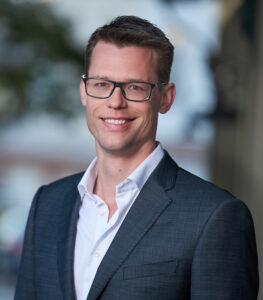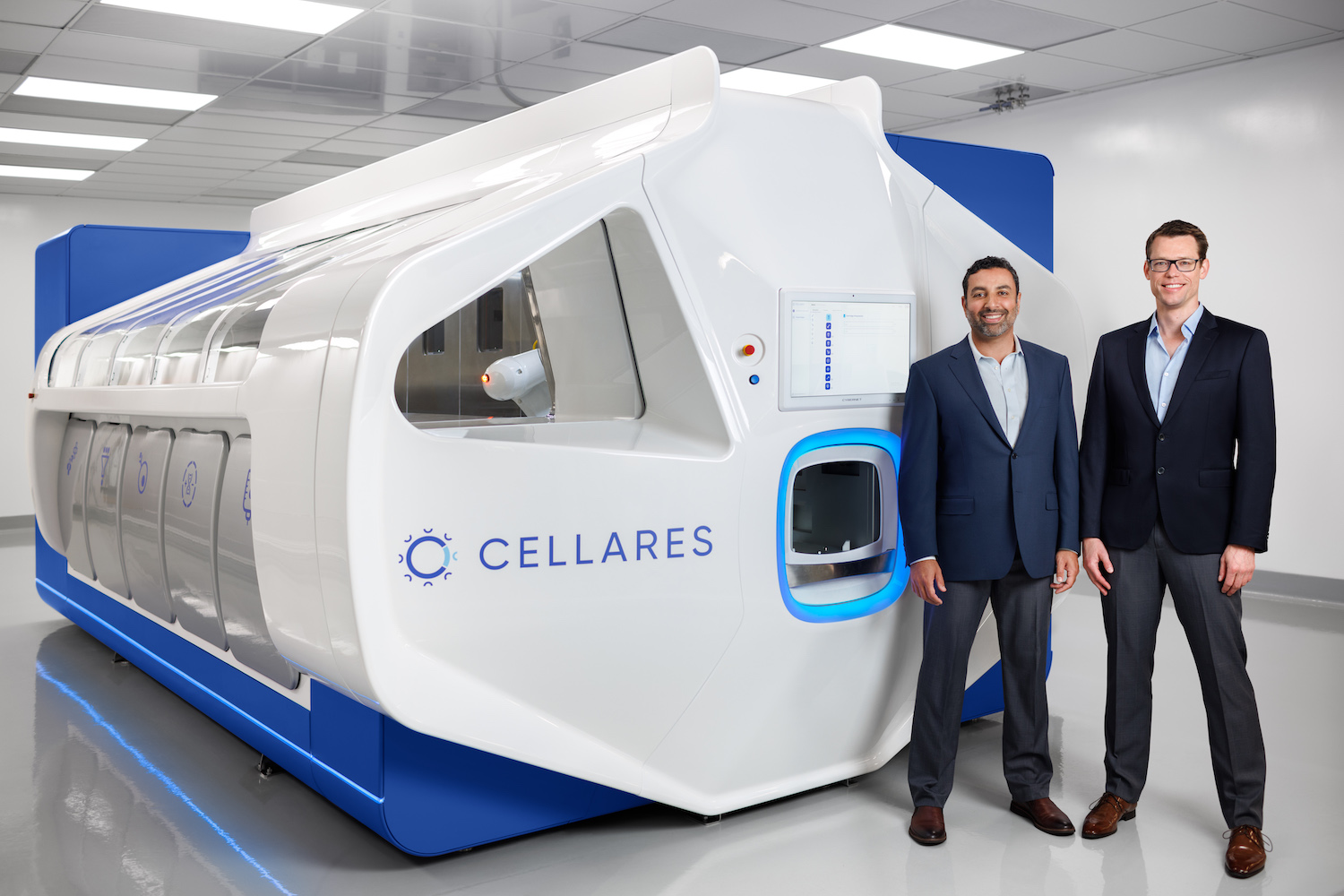Fabian Gerlinghaus, born and raised in Germany, was trained as an aerospace engineer in Munich. He moved to the United States about ten years ago, worked briefly at Stanford, and then moved into the life science tool space, joining genome engineering company Synthego, which at the time was a mere start-up with five people working in a garage.
There, he co-invented their proprietary RNA synthesizer technology, taking it from a napkin sketch to commercial readiness. Synthego, according to Gerlinghaus, still uses this technology to create CRISPR guide RNAs for customers and to provide genome engineering services.

Gerlinghaus eventually moved internally to build up a new research department that was focused on tools and technologies for the bioprocessing industry. During that time, he attended a lot of conferences that covered both traditional bioprocessing and cell therapies.
“If you were listening back then at any of these conferences, people were shouting from the rooftops that we need closed, automated, scalable cell manufacturing technologies,” Gerlinghaus told GEN Edge.
He decided to leave his position as Synthego’s chief innovation officer to start Cellares with co-founder Omar Kurdi. That was at the beginning of 2019, and since then, Cellares has raised $355 million in total. “I’ve grown the company from just the two of us to about 170 people right now,” said Gerlinghaus. “Most importantly, we’ve built what we set out to build.”
All aboard the cell shuttle
“We had a patient speak to the entire company recently. She’s gone through the first few rounds of treatment and knows that she’s in remission right now but that her cancer is most likely going to come back,” said Gerlinghaus. “At that point, the next step for her would be an FDA-approved CAR T-cell therapy that’s on the market today. I’m not going to name which one, but her worry and concern is that when that time comes, she won’t be able to get it because of the manufacturing bottleneck. Ultimately, that’s the problem that we’re here to solve at Cellares. We’re here to meet the total patient demand for cell therapies globally by scaling out and building smart factories around the world.”
The technology to address this problem is Cellares’ Cell Shuttle, the first end-to-end, fully automated, high-throughput cell therapy manufacturing platform that, Gerlinghaus said, enables real walkaway automation.
“We’ve got a working Cell Shuttle that actually fully automates real CAR T-cell manufacturing processes from start to finish,” said Gerlinghaus. “You load the apheresis from the patient or from the healthy donor, and you come back when the process is complete and pick up a cell therapy that’s ready for testing and infusion.”
One of the most difficult problems that Cellares has solved for the Cell Shuttle is supporting interchangeable cell therapies. Gerlinghaus said that the Cell Shuttle supports about 90% of cell type modalities for autologous and allogeneic cell therapies: CAR-T, TCRs, etc. If it’s in a suspension of cells, the Cell Shuttle can likely work with it.
“We built a lot of modularity and flexibility into the consumable cartridge, and we moved the customization problem from hardware to software,” said Gerlinghaus.
For example, if a customer arrives with a new type of cell therapy that requires a different fluid and internal connection to the cell cartridge, this turns into an engineering project. It necessitates a rethinking of the build design, testing of the new cartridge, and verification and validation to file a new drug master file (DMF) with the FDA, which is no small feat.
By comparison, Cellars’ integrated consumable cartridges are reagent-agnostic and designed to mix and match the different Cell Shuttle operations. The flexibility is accessed through a process design software suite where researchers can click together a workflow.
“Nobody really solved this problem before we did,” said Gerlinghaus. “Every attempt that came before us had this shortcoming where it was a very rigid manufacturing solution that you couldn’t modify, locking you into this one process and making it unusable for a lot of other cell therapy processes.”

Gerlinghaus said that the Cell Shuttle is functionally equivalent to a hundred different benchtop instruments. It supports flow and filtration, magnetic cell sorting, electroporation, on-board QC capabilities, an automated fridge, and more. It even automatically generates electronic batch records, which in many cases are still manually generated.
An important attribute of the shuttle is that it reduces the facility space and the labor that’s required by about 90 percent compared to the bench-top instruments and manual approaches currently in use. That’s about a ten-fold increase in productivity and scalability from our smart factories. Gerlinghaus said that with the same number of people and the same amount of floor space, the Cell Shuttle could produce 10 times more cell therapies than anybody else in the industry.
“We’re taking an industry 4.0 approach to the whole problem,” said Gerlinghaus. “By combining advanced robotics and interconnected software in smart factories, you get much higher productivity, ten times higher, with very little human intervention and human contribution. I think that’s what the industry needs to ultimately meet the total patient demand for patients.”
Gerlinghaus said one Cell Shuttle can produce up to 3,000 cell therapies per year (depending on the length of the process).
TAPped in
Today, Cellares and Lyell Immunopharma (NASDAQ: LYEL), a clinical-stage T-cell reprogramming company advancing a pipeline of cell therapies for patients with solid tumors, announced that Lyell will evaluate the Cell Shuttle through Cellares’ Technology Adoption Partnership (TAP) program. As part of the collaboration, the companies have agreed on a proof-of-concept technology transfer process for the manufacture of Lyell’s LYL797 CAR T-cell therapy using the Cell Shuttle.
LYL797 is an investigational CART-cell therapy in development for the treatment of solid tumors that express ROR1, a protein present on the surface of various solid tumors. LYL797 is enhanced with Lyell’s novel genetic and epigenetic reprogramming technologies designed to generate highly tumor-reactive, longer-lasting functional T cells. Lyell is enrolling patients with triple-negative breast cancer and non-small cell lung cancer (NSCLC) in a Phase I clinical trial evaluating LYL797.
“I’m super excited to have Lyell as the most recent company to join our TAP program,” said Gerlinghaus. “With TAP, we’re working with a number of different companies, taking their manual processes, transferring them onto the Cell Shuttle to basically automate the process, and then creating a data set for the customer that shows that the Cell Shuttle is a viable, cost-efficient solution for their particular cell therapy process. And we can manufacture their cell therapy process at the Cell Shuttle meeting, with all of the critical quality attributes that we align with the customer.
Last month, Cellares publicly announced Bristol-Myers Squibb as a TAP partner. Similar to the Lyell deal, the pharma leader will enter into a proof-of-concept transfer process for one of its CAR-T cell therapies using the Cell Shuttle.
Factory of the future
Also last month, Cellares announced it had raised $255 million in Series C, of which Gerlinghaus is quite proud.
“It’s one of the largest financings in our industry in a while,” said Gerlinghaus. “We raised more money in the private round than other companies have raised in IPOs. And while everybody else seems to be raising flat rounds and down rounds, this was an up round with a really good step up in valuation, which I think reflects the excitement in the investor community.”
The money will be used to get to market, which means a couple of different things. Cellares will launch its first Integrated Development and Manufacturing Organization (IDMO), or smart factories, to meet global demand for life-saving cell therapies. This facility is in Bridgewater, New Jersey, and is a 118,000-square-foot facility with 50 Cell Shuttles. This, Gerlinghaus said, provides a capacity for 40,000 cell therapy batches per year (if running a process for autologous cells that is seven days long).
As cell manufacturing processes become shorter and shorter, the throughput of the Cell Shuttles goes up. If the seven-day autologous cell manufacturing process were to drop to two days, the throughput could go up to 140,000 cell therapies per year out of the Bridgewater facility.
Cellares also intends to make the New Jersey location and an existing smart factory in South San Francisco certified GMP facilities in 2024, which is no small task. This requires facility construction, shuttle building, and employee hiring and training.
Some of the money from the Series C will go to Cellares’ R&D pipeline. Gerlinghaus said that the pipeline is currently focusing on process development for cell therapies, some of which is at the expense of their gene therapy work. That said, most cell therapies are genetically modified, so there’s an overlap in the process of development.
The cell manufacturing bottleneck
One of the reasons that Cellares’ approach is so valuable is because it busts open the cell manufacturing bottleneck. Gerlinghaus tells me that it’s well known that patients die on the wait list because of the cell manufacturing bottleneck. Furthermore, a recent study found that only around 40 percent of RRMM patients who had already been treated heavily and were on a waiting list for the commercially available BCMA CAR T-cell therapy idecabtagene vicleucel (Abecma; ide-cel) received treatment within a year.
The waitlist problem for cell therapies isn’t going to improve with more cell therapies in development, as the FDA projects that they’ll be approving 10–20 new cell and gene therapies annually. At the same time, cell therapies are moving up the treatment plan from the fourth line to the third line and even the second and first lines. As the number of FDA-approved cell therapies increases and cell therapies continue to move into earlier treatment tiers, the number of people on the waitlist increases.
All in all, the demand for manufactured cell therapies is going nowhere but up.



